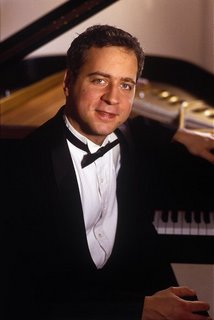Randall Scarlata and Jeremy Denk
 I was drawn to the concert hosted by the Foundation for Advanced Education in the Sciences on Sunday afternoon mostly to hear Jeremy Denk play the piano. I know about Jeremy Denk because he writes a blog, Think Denk, and has an expansive, theoretical approach to writing about the music he plays that I find quite satisfying to read. That is probably because it's the sort of intellectual assessment -- not exclusively so, of course -- that you may recognize here at Ionarts, or at least the expansive part. Denk's mind is some part scientist -- he also holds a degree in chemistry -- so he fits right in with the FAES crowd. In my experience, scientists -- and, to a slightly lesser degree, mathematicians -- are more likely to be denizens of classical music concerts than our colleagues in the humanities. Many scientists maintain capable amateur playing skills themselves, which is the way to be.
I was drawn to the concert hosted by the Foundation for Advanced Education in the Sciences on Sunday afternoon mostly to hear Jeremy Denk play the piano. I know about Jeremy Denk because he writes a blog, Think Denk, and has an expansive, theoretical approach to writing about the music he plays that I find quite satisfying to read. That is probably because it's the sort of intellectual assessment -- not exclusively so, of course -- that you may recognize here at Ionarts, or at least the expansive part. Denk's mind is some part scientist -- he also holds a degree in chemistry -- so he fits right in with the FAES crowd. In my experience, scientists -- and, to a slightly lesser degree, mathematicians -- are more likely to be denizens of classical music concerts than our colleagues in the humanities. Many scientists maintain capable amateur playing skills themselves, which is the way to be.
The all-Schubert program was supposed to begin with the A minor sonata, D. 784. However, Denk made an announcement when he came on stage that he was not going to play the Schubert. Instead of "that little sonata," as Denk put it, we were treated to a surprise performance of Bach's third keyboard partita (A minor, BWV 827), a piece that I have been listening to a lot, in the recording by Cédric Tiberghien that I reviewed recently. Bach, of course, wrote primarily intellectual music, or rather, there is a level of beauty in Bach's music underneath the mere sound of the notes that only the mind can appreciate. It does not surprise me that Denk is experiencing "something of an obsession with Bach lately." His remarks to the audience about this partita, giving a brief overview of its seven movements, were didactic, an attempt to give the audience a chance at hearing the music the way he does. This partita's gigue is enjoyable to listen to in complete ignorance, but when you realize that the B section's theme is that of the A section inverted (as in many of Bach's bipartite suite movements), the mind boggles as well as the ear.
Bach the Romantic (December 17, 2005) Hemiola with a Conscience (December 6, 2005) |
The concert, however, was not only about hearing Jeremy Denk, because most of the program was devoted to a complete performance of Schubert's exquisite Die schöne Müllerin, D. 795, a cycle of 20 songs with texts drawn from the work of Wilhelm Müller by the same name. If you don't know this cycle, it's about a schizophrenic homeless man who stalks the daughter of the hapless miller who generously gives him work. Not surprisingly, since women are always turned off by the smell of male desperation, the millmaid chooses instead a hunter who does not spend his afternoons in imaginary dialogues with brooks and streams. In an age before Prozac and Zoloft and when all sorts of young Romantic heroes found suicide fashionable, the young man ends up throwing himself into the river. As improbable as it sounds from the crazy story, it's a thing of beauty, if not my favorite Romantic song cycle.
Baritone Randall Scarlata performed the vocal part, bringing a reserved presence, fine German diction (I would expect nothing less of someone who won First Prize at Vienna's Das Schubert Lied International Competition in 1997), and nice range of timber to an ear-pleasing rendition with Jeremy Denk at the piano. The best moment was in "Die liebe Farbe," which I have usually read as the last gasp of the narrator's manic hopes. Scarlata turned this around in a moment of edgy bitterness, singing "Mein Schatz hat's Jagen so gern" (My sweetheart is so fond of hunting) almost through clenched teeth. Scarlata's voice is mellow, with great sweetness in the higher register rather than power, including a fluty head voice that served nicely for the millmaid's voice in "Am Feierabend" and the tender, self-pitying suicide note of "Trockne Blumen." My only reservation was that some of the brisk tempi ("Ungeduld" and "Mein!") went beyond conveying agitation and just sounded a little rushed. Denk's work at the keyboard was a model of restraint and dramatic color, with fine variations in sound in the strophic songs. In this interview for NPR, Denk admitted that Schubert was his favorite composer and that the Fischer-Dieskau and Gerald Moore Winterreise was a favorite recording. This came across in his performance, too, as Denk was often seen mouthing the German words sung by Randall Scarlata.
The next FAES concert will feature the Kuss Quartet, on January 22 at 4 pm. They will play quartets by Berg and Mendelssohn, the Mozart Adagio and Fugue, and excerpts from Bach's Art of the Fugue. The concerts take place in the Mondzac Performing Arts Center, on the campus of Bethesda's Landon School.





















































No comments:
Post a Comment